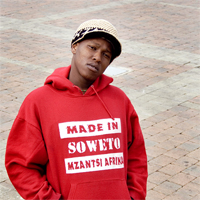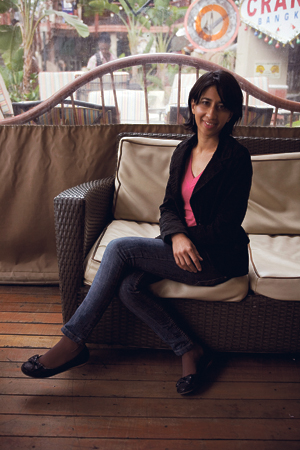‘Are you the guys from the Mail & Guardian?”
Simon Visser asks, extending a hesitant hand, when he sees the photographer and me standing close to the gate of his family home in Melville.
The 15-year-old is home early from Linden High School after his Afrikaans exam. Tall and languid, with an easy grace, Visser talks in slightly muffled tones.
There’s something of the geek about him. Halfway through the interview he says he wants to become a software developer. He doesn’t watch much
television and, as the son of Liza Albrecht, editor of Rapport, has more than his fair share of newspapers to peruse.
He wants to study at Stellenbosch University and is toying with the idea of working abroad and mentions New York a few times during the half-hour interview. ‘I would want to work here but there’s more money in New York,” says the grade 10 learner.
He has been abroad and visited China, a place he found ‘sort of strange [but] I was pretty young then”. He says, rather vaguely, that the country under Jacob Zuma can only get better. Zuma, he believes, brings something new to the presidency.
‘He’s a man of the people.”
Visser has lived most of his life in Cape Town and moved to Johannesburg at the beginning of this year. ‘It’s a nice town. Everything is close together,” he says about the city. ‘Of course it is much bigger.
It seems they are building everywhere.” Visser is a fan of science fiction, hip-hop and light rock music, but doesn’t like Afrikaans rock, which he describes as boring. ‘It all sounds the same.”
He’s nonchalant about the Afrikaans language. ‘If the language is dying, it is the fault of those who speak it. If people want to speak Afrikaans they will speak it.”

Vocalist, percussionist and spoken word poet Tshidiso Setshogwe didn’t vote in the last election.
And, at 26, Setshogwe is more than eligible to vote, but he felt there was no point. ‘There isn’t any suitable leadership,” he says, adding that most politicians are interested only in enriching themselves. ‘I don’t really feel people know what it
means to vote.” Setshogwe says South Africa’s young people are ‘alienated”.
He talks about them in alienated terms as though he is a geriatric. ‘They live in South Africa but their minds are elsewhere. They don’t know what they should be doing.”
Setshogwe, who is a partner in a T-shirt printing business that celebrates Soweto, doesn’t want to work for anyone. We conducted the interview at Kaldis, a street away from the Market Theatre where he has a stall. ‘We were raised to be labourers. We need to be self-reliant.
We have a huge economic fight on our hands.” He feels empowerment has not come to the country’s black majority. ‘A lot of our businesses are still on the streets. There has been no meaningful black economic empowerment.
We were not taught to make money, but to spend it.” He says the mouths of the youth are muzzled. ‘We need to hear what the youth are saying. The older people can’t always be saying abantwana banamhlanje (the children of today).”
As the vocalist for Skin 2 Skin — an Afro-fusion band — Setshogwe has been trying, in vain, to release a CD. He says one of the reasons they are not signed up to a label could be because they ‘don’t play fluff”.
Setshogwe talks about ‘wanting to change the way people think through our music”. He rails against music ‘with no content and creativity” that has turned South Africa’s youth into ‘sexual animals” and ascribes the reason ‘our youth are messed up” to ‘contentless” music.

Atiya Mosam is what the French call petite.
I imagine she is the kind of woman who has to carry her ID book with her if she wants to go to clubs where they strictly enforce the no-under-18 rule, although she recently celebrated her 27th birthday.
Mosam studied medicine at Wits University; she works at the Mofolo Clinic in Soweto where she’s doing her community service. She doesn’t plan to venture into private practice any time soon. And she didn’t go into medicine to make money. ‘If I wanted to make money I would have done accounts,” she says.
Mosam has observed a creeping materialist attitude among her peers, which she attributes to apartheid when the black majority ‘never had”. She has not thought of emigrating. ‘We all can’t leave,” she says. ‘I love this country, its diversity. It has a lot to offer.”
As a medical doctor, she lives closely with disease and death and doesn’t think the country’s youth understand HIV/Aids that well. ‘I don’t think the awareness is at the level it should be.” She finds females more aware of Aids than males. ‘I have fewer male patients.
There’s a bit of denialism with men.” More should be done to set up youth groups that spread Aids awareness to their peers. ‘They listen to one another,” she says.
Mosam, who is Muslim, doesn’t watch a lot of television. She has a liberal and personal interpretation of her religion, perhaps proved by the fact that she ‘doesn’t wear the scarf”.
A day or so after we spoke, I received a text message from her to a question I had asked. She felt she had not answered it exhaustively. I wanted to know what South Africa’s youth should be doing for the country. Her SMS quoted from the late Coretta Scott-King, Martin Luther King Jr’s wife: ‘We can’t help everyone but everyone can help someone.”